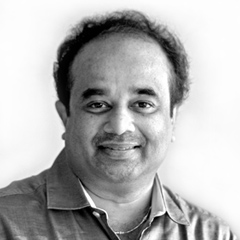Standing bars became popular in Kerala, when bars had their heydays in the state. People could go into a standing bar, buy a quick drink, gulp it on one go and then leave, neat and ‘fit’; it hardly took five minutes for the whole process to complete. When bars were given a standing send-off in the state, tipplers had to bid adieu to the quick and 'convenient' mode of drinking too.
What started off and was subsequently left off in standing bars have now been picked up by vendors of the less-heady tea, even as 'tea shops'- as they are popularly known- are dying a quite death in the state. Now, all you have to do is to have a roof along the pavement, which serves as infrastructure for a tea stall. These stalls that offer local snacks with tea are raking in significant profits each day. Since overheads are negligible and rent- if at all- is less, net profits are quite high. The staff is made of a bearer and a cook. Considering that a tea with a snack costs Rs 14 to Rs 18, one can easily see the money in the business. A stall selling 100 teas and snacks a day can easily make Rs 700 and above as net profit.
Big brands have created a coffee-shop niche in big cities, which is best avoided by those with a modest purse. Local tea stalls operate under the same business model while keeping prices very very modest.
Perhaps lateral thinking in those lines irked the idea of a Tea Shop, in the lines of the posh Coffee Shop. Some ventures were started in New Delhi where ‘Chayos’ and ‘Chai Point’ made their appearances. When big tea brands saw the rush in such places, they decided to sit up and take notice; Soon they might stand up and startup.
Indians are mostly tea drinkers, at least when the majority of them are not drinking 'spiritedly.' The Kava in Kashmir, which is tea mixed with powdered almonds; the world famous Darjeeling tea and the tea served in mud bowls in north India are all part of this tea culture. You can see the bliss that the hot tea gives when you look at the face of a person enjoying a cup of spiced tea in the bitter cold winters in India. The cuppa available in coffee shops perhaps is less blissful and leaves a snobbish streak on your face.
Now posh Tea Shops are being started by IIT and Harvard graduates. Chayos was started by Nithin Salooja (IIT Mumbai) and Raghav Varma (IIT Delhi). Harvard MBA Amoolik Singh launched Chai Point. As in coffee shops, tea served in these joints too have glamorous names although they do not sound so exotic- and confusing- as those in the coffee shops. So instead of Cafe Latte and Cafe Nirvana, you have the humble-sounding Tulsi, Masala, Kali Mirch, Cinnamon and Elaichi brands, of course decked up and grandiose in their own big ways. Unlike the Italy-inspired coffee shops, the tea flavours are truly Indian and spicy. For example, a flavour called Hari Mirchi, made from green pepper, will leave you flaming, end to end.
These Tea Shops also offer snacks such as Vada Pav, Keema Pav, Bun Bujiya, Egg bun and so on. Most of these snacks are unique to that shop. Obviously customers would miss our 'pazham pori' and 'milaku bajji.' So how about a Tea Shop in Kerala with local fare? Anyone?
Tail piece: It seems a typical Mallu went to a tea stall and ordered cups of green tea and gulped them all down. He was going on a long ride and was taking necessary precautions, sipping 'anti-accident' green tea.
























































































Disclaimer
The comments posted here/below/in the given space are not on behalf of Manorama. The person posting the comment will be in sole ownership of its responsibility. According to the central government's IT rules, obscene or offensive statement made against a person, religion, community or nation is a punishable offense, and legal action would be taken against people who indulge in such activities.